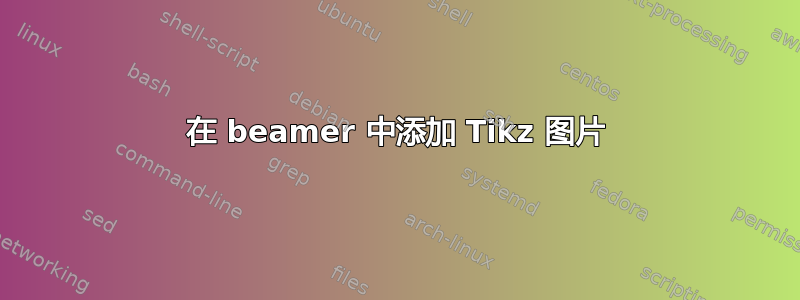
我是一个新的 Beamer 用户,当我尝试在 Beamer 演示文稿的幻灯片上添加 Tikz 图片时,我不知道出了什么问题,它一直在与我想要的不同的帧(即幻灯片)上显示。我该如何解决这个问题?
\begin{frame}
\frametitle{Introduction} % Table of contents slide, comment this block out to remove it
\tableofcontents % Throughout your presentation, if you choose to use \section{} and \subsection{} commands, these will automatically be printed on this slide as an overview of your presentation
\end{frame}
%----------------------------------------------------------------------------------------
% PRESENTATION SLIDES
%----------------------------------------------------------------------------------------
%------------------------------------------------
\begin{frame}
\section{Section 1}
\subsection{Description.}
\begin{tikzpicture}[
dot/.style={circle,fill, inner sep=1.5pt, outer sep=0pt},
every label/.style={inner sep=0pt}]
\newdimen\R \R=1cm
\foreach \i [count=\j] in { 1,2,3,4,5,6}
{
\node (n\j) [dot, label=60*\j:$\i$] at (60*\j:\R) {};
\draw[blue,thick] (0,0) -- (n\j);
}
{
\foreach \i in {1,2,...,6}
\foreach \j in {\i,...,6}
\draw (n\i) -- (n\j);
}
\end{tikzpicture}
\section{Section 2}
\end{frame}
答案1
\section为了帮助解决这个问题,我整理了一个 MWE 来展示分段命令(和\subsection)和框架标题之间的区别。
此外,如何article从投影仪演示文稿(演示模式)中制作文档、类别(文章模式),并隐藏一些框架。
编译代码将产生一个由 6 个框架 (F1 到 F6) 组成的投影仪演示:标题 (F1)、概述 (F2)(显示章节和小节的结构 \tableofcontents,但不是框架列表!)和 4 个带有内容的附加框架。
F4 Connectionstikz 图形位于子部分下的框架中Description。
代码处于 beamer 模式。请注意,\section和\subsection命令是在框架环境之外使用的。
要切换到文章模式,请对 和 进行评论 并\documentclass{beamer}取消评论 。\documentclass{article}\usepackage{beamerarticle}
第 5 帧被标记为,\mode <presentation>因此它将在模式演示中显示,但不会在模式文章中显示。
结果是一篇三页的文章:标题页、显示章节和小节的目录以及框架中使用的标题F2 Overview,以及包含内容的页面,其中框架标题显示为,\paragraph因为每个框架都会发出一个\paragraph*{<frame title>}。
正如预期的那样,第 5 帧没有出现在第 2 节下。
请注意,\newpage和\bigskip命令在文章模式下很有用,但在演示模式下无效。
要在 beamer 模式下生成帧列表,请参见https://tex.stackexchange.com/a/56541/161015
演示结构
Beamer 框架 #2 使用\tableofcontents
Beamer 框架 #4,tikz 图形
文章模式,目录
文章模式,内容
% !TeX TS-program = pdflatex
\documentclass{beamer} %Un-comment to produce a presentation
%\documentclass{article} %Comment to produce a presentation
%\usepackage{beamerarticle} %Comment to produce a presentation
\usepackage[utf8]{inputenc}
\usepackage[T1]{fontenc}
\usepackage{lmodern}
\usepackage{tikz}
\usepackage{graphicx} % for logo
\usetheme{Madrid}
\usecolortheme{beaver}
\renewcommand{\contentsname}{} % use the frame name
\begin{document}
\author{The author name}
\title{F1 Beamer template}
\logo{\includegraphics[height=0.8cm]{example-grid-100x100pt}}
% \setbeamertemplate{navigation symbols}{} % hide navigation symbols
\begin{frame}[plain] % cover F1
\maketitle
\newpage % works only in article mode
\end{frame}
\begin{frame}
\frametitle{F2 Overview} % Table of contents slide
\tableofcontents % Throughout your presentation, if you choose to use \section{} and \subsection{} commands, these will automatically be printed on this slide as an overview of your presentation
\newpage % works only in article mode
\end{frame}
\section{Section 1}
\begin{frame}{F3 in Section 1}
\bigskip% for article mode
As any dedicated reader can clearly see, the Ideal of
practical reason is a representation of, as far as I know, the things
in themselves; as I have shown elsewhere, the phenomena should only be
used as a canon for our understanding.
\end{frame}
\subsection{Description}
\begin{frame}{F4 Connections}
\centering
\bigskip% for article mode
\begin{tikzpicture}[
dot/.style={circle,fill, inner sep=1.5pt, outer sep=0pt},
every label/.style={inner sep=0pt}]
\newdimen\R \R=1cm
\foreach \i [count=\j] in { 1,2,3,4,5,6}
{\node (n\j) [dot, label=60*\j:$\i$] at (60*\j:\R) {};
\draw[blue,thick] (0,0) -- (n\j);
}
{\foreach \i in {1,2,...,6}
\foreach \j in {\i,...,6}
\draw (n\i) -- (n\j);
}
\end{tikzpicture}
\end{frame}
\section{Section 2}
\mode<presentation>{ % % Only shown in presentation,
\begin{frame}{F5 in Section 2}
Shown only in mode presentation.
\end{frame}
}
\begin{frame}{F6 in Section 2}
\bigskip % for article mode
As I have shown elsewhere, Aristotle tells
us that the objects in space and time, in the full sense of these
terms, would be falsified.
\end{frame}
\end{document}








